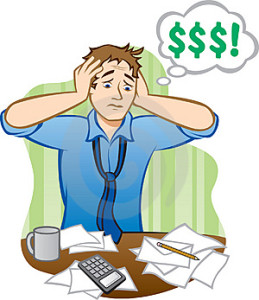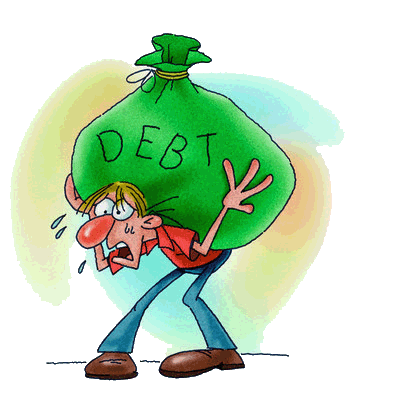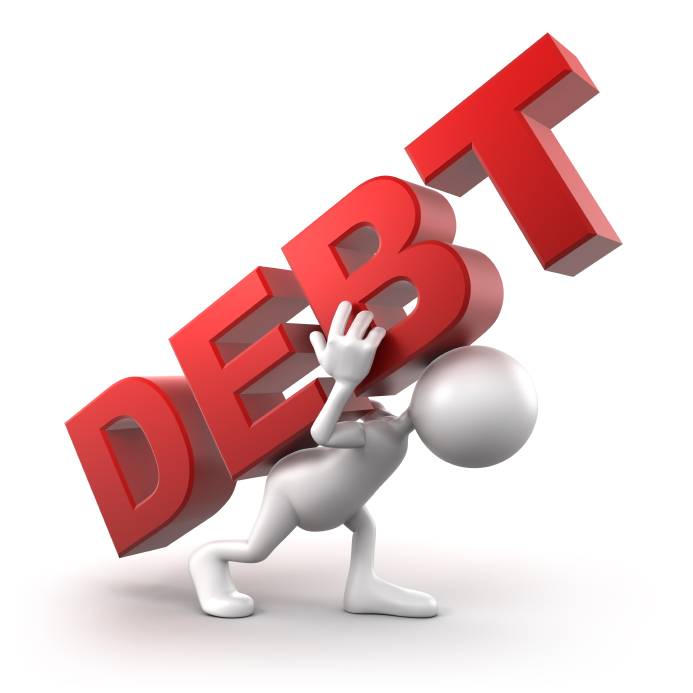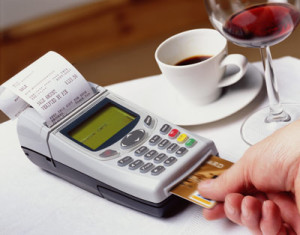 You can’t deal with another credit card bill, you feel stressed when you check your bank balance, and the word “interest” makes you flinch in any context. Chances are good you’re suffering from credit card debt! Thanks to the ease with which most of us can get credit cards and the temptation of what seems like free money, there are a lot of people in your shoes, but many more have managed to control and eliminate credit card debt, too.
You can’t deal with another credit card bill, you feel stressed when you check your bank balance, and the word “interest” makes you flinch in any context. Chances are good you’re suffering from credit card debt! Thanks to the ease with which most of us can get credit cards and the temptation of what seems like free money, there are a lot of people in your shoes, but many more have managed to control and eliminate credit card debt, too.
No five-step program can address all situations, so don’t take every step in this program as law, but chances are good some of these steps might help you get to a debt-free life once again.
1. Tally up your debt and your assets.
It seems like both the most boring step and the most frustrating, but before you begin to get out of debt, you need to know exactly how far you are in the hole. Without an idea of what you have and what you owe, you’ll stagnate and you won’t have the motivation to keep making progress on your credit card bills.
First, gather all your bills. If you have debt on multiple credit cards, gather statements so you know exactly how much you owe on each card. Don’t know how much you have in the way of assets? Sign into your online banking account or visit your bank to get a tally of your finances, if you have anything invested or saved up.
Create a neat inventory that lists everything you owe, and to whom. Also, make a note of the interest rate on each credit card, as this will affect the order in which you pay down your debts. Try not to feel intimidated by the final number, whatever it is. You will figure out a way to control it and pay it down.
2. Create a budget.
If tallying it up wasn’t bad enough, you have to create a budget now? Don’t worry! It’s much simpler than it looks, and budgeting will help you get out of this mess much faster. You’ll also be able to avoid getting into debt in the future.
Despite the fact that budgeting seems like it will make you more stressed about your finances and able to relax less, the opposite is actually true. When you know how much you have to spend, you won’t have that nagging worry in the back of your mind that tells you this is a bad idea. You can spend guilt-free and not suffer negative consequences like you’re feeling now.
Create basic categories for each area of spending, including rent, utilities, tuition (if any), transportation (gas and auto maintenance), and so on. Downloading a basic budgeting software application will help you figure out these categories to start with, and you can later create your own based on your spending patterns.
Then, make a list of your regular expenses. If you know you will spend a fixed amount on rent, you can write that down. If you spend about the same amount each month on your electricity, write down a ballpark figure and round it up a bit to cover higher bills. Do the same for your income, averaging your last three to six months’ income if you make an inconsistent income (as a freelancer, for example).
When all is said and done, you should have a rough monthly figure of how much you spend and earn. You’ll already have spotted any problems that exist – more money spent on shopping trips than rent, for example. Again, don’t stress if the numbers are higher or lower than you wanted them to be. Frugal living advice will help you prune your expenses, and you can look at other sources of income.
3. Plan your debt repayments.
If you have more than one source of debt – credit cards, student loans, a mortgage, etc – you will have to prioritize your debt repayments. There are two main methods of doing this: by interest rate or by amount owed. If you are motivated by quick results, the snowball method is best; if you prefer to get the debt paid off more efficiently without wasting money on interest, the interest method is for you.
The snowball method works like this: arrange your debts in order from the smallest amount to largest. You’ll pay off the smallest debt first, then the next largest, and so on until you finally tackle the largest amount. By that time, you’ll have the motivation to really work on your last remaining debt.
The interest method is smarter money-wise, but it takes a lot more persistence and patience. Be honest with yourself – will you stick to it when it seems like you aren’t making much progress? If you choose this method, you’ll arrange your debts by the interest rate you’re currently paying on them and you’ll work on the highest interest rate first. The money you save on interest and payments will then help you pay off the next-highest rate, and so on.
4. Slash your expenses.
In order to pay down your credit card debt, you’re going to be putting aside as much money as you can! This means you should stop using your credit cards and pay only with cash from now until you’re out of the red. Be gentle, yet firm with yourself about it. If it helps, use the envelope system or take out a fixed amount each month, and set up your bank account to automatically withdraw the rest of your paycheck and transfer it to your credit card.
When you created your budget, did you honestly record about how much you spend each month, or did you round down the numbers to attempt to get yourself to improve? If you rounded everything down drastically, it’s going to take a lot more effort to pay off your debt, but you absolutely can do it.
Look at what’s essential – food, utilities, and so on – and what isn’t. Allow yourself one category in which you won’t cut down your spending. It might be going out for movies, restaurant meals, shopping for clothes, or books. This doesn’t mean you’re allowed to spend all the extra money you’ll have on it, but it ensures that you won’t be sacrificing everything fun for the sake of your future financial health. Everything else should be cut by a small amount – try ten percent.
5. Control your spending until your debt disappears.
As you go about your daily shopping, keep a small notebook with you. Write down everything that you buy, and don’t let yourself slack! Alternatively, you can keep your receipts and enter them in your budgeting program later, but don’t let this be an excuse to avoid thinking about your spending. The point is to consciously think about every decision you make to buy something.
If you want to get your credit card debt under control, relentlessly stick to your budget. Each time you exceed your budget, consider whether you were overspending for an impulse buy that you didn’t really need, or whether you need to allocate more money in your budget to this category. You will inevitably find things you can cut way back on, and things that you will have to loosen up a bit on.
Perhaps you find yourself tempted to buy things on a daily basis, and it’s hard for you to keep that long-term goal in mind. That’s true of everyone, and that’s often how we get into credit card debt in the first place! Keep a small Post-It note on your credit card. It doesn’t even have to say anything, but you want to, write on it your main reason for paying down your debt: freedom, your child’s name, etc.
The process of paying down your debt won’t be easy, but it is one of the most satisfying and liberating things you can ever do. You’ll find out more about your interests and what really matters to you, you’ll learn how to set goals and achieve them even when it seems impossible, and you’ll clear your credit record so that you can achieve any financial goals you’re now free to pursue!
Sam Jones, the author, had to use credit card consolidation after failing to manage his credit cards effectively.
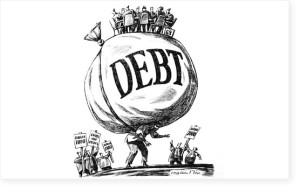 Facing debt alone can be a challenging and frustrating experience. Unfortunately, getting into debt happens a lot quicker and easier than getting out of it, and the journey to becoming debt free can sometimes feel unsurmountable. The hardest step is admitting that you might need to seek help, so here are a few of the great benefits that you can experience from seeking professional debt assistance.
Facing debt alone can be a challenging and frustrating experience. Unfortunately, getting into debt happens a lot quicker and easier than getting out of it, and the journey to becoming debt free can sometimes feel unsurmountable. The hardest step is admitting that you might need to seek help, so here are a few of the great benefits that you can experience from seeking professional debt assistance.












